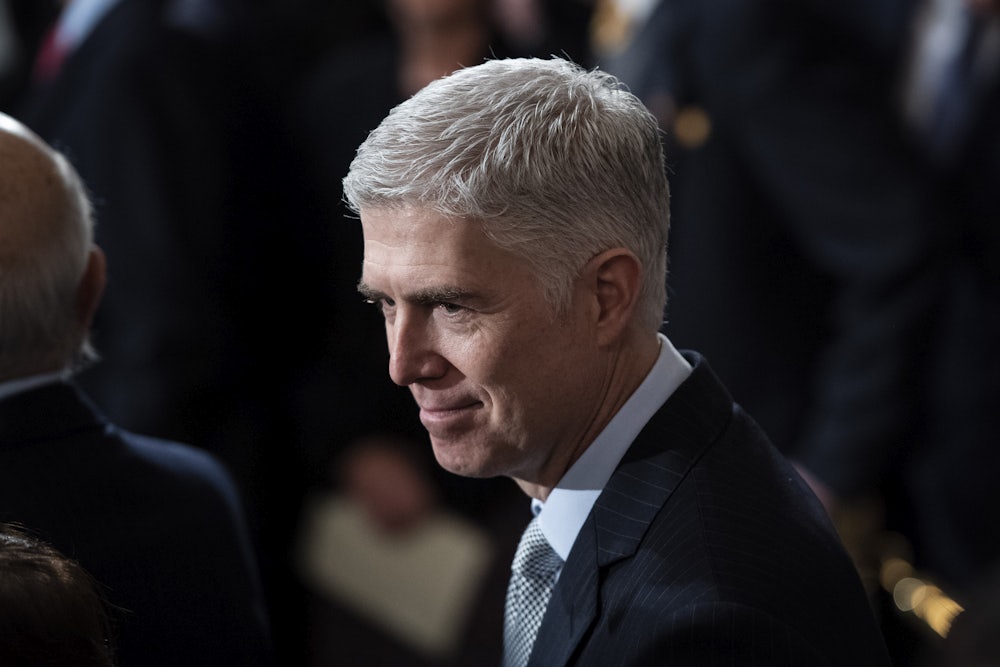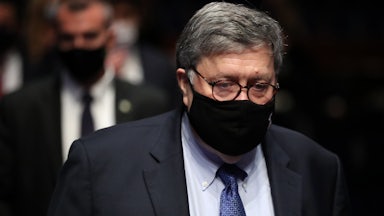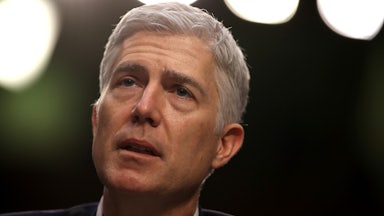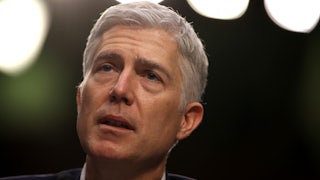“At the far end of the Trail of Tears was a promise,” Justice Neil Gorsuch wrote two years ago in McGirt v. Oklahoma. His majority ruling recognized that the Muscogee (Creek) Nation’s reservation still existed because Congress, implicitly keeping that promise, had not explicitly disestablished it when Oklahoma became a state in 1907. The 5–4 decision effectively turned half of the state back into Indian country.
Just over a year later, the state of Oklahoma is trying to break that promise again. State officials filed a petition last week in Bosse v. Oklahoma that asked the Supreme Court to take an extraordinary step: reverse its decision in McGirt and declare that the tribes’ reservations no longer exist. The high court’s ruling had created widespread issues in the state’s criminal justice system, Oklahoma officials argued, because only the federal government can try certain crimes committed on tribal lands.
“At the same time, the foregoing issues are merely symptoms of a deeper problem,” the state said in its petition. “In truth, the problem is McGirt itself, and the reconsideration of that decision is the only realistic avenue for ending the ongoing chaos affecting every corner of daily life in Oklahoma. The State of Oklahoma respectfully requests that the Court overrule its decision in McGirt, which was profoundly flawed and is causing unprecedented disruption.”
Oklahoma’s depiction of the McGirt fallout should be unpersuasive for the justices. The court issued the ruling with a full understanding of the potential consequences of the decision. While the justices often consider the practical effects of their decisions, they also have higher priorities. Oklahoma is hoping that they will bend the usual rules on its behalf. But for the Supreme Court to reverse itself now would be a profound insult to Native Americans, to tribal sovereignty, to itself, and to the rule of law.
In theory, this should be the longest of long-shot requests. It’s relatively rare for the Supreme Court to overturn one of its previous decisions; it’s virtually unheard of for the court to overturn a decision that is just over a year old. But there are some indications that a majority of justices might be willing to do so. Earlier this year, Oklahoma state courts tossed out the state conviction of a non-Indian man who killed a Native American woman and her two children, citing McGirt. In May, the Supreme Court stayed the ruling pending the court’s decision on whether to hear the case.
The ruling in McGirt sprang from the unusual circumstances surrounding Oklahoma statehood. Though Congress moved to dismantle tribal governments and lands in the years before Oklahoma joined the Union, it never explicitly disestablished the Muscogee (Creek) Nation’s reservation, which had been guaranteed to them by an 1866 treaty with the federal government. This is no mere technicality. Abolishing a tribal reservation is among the most consequential steps that Congress can take on tribal sovereignty, and the Supreme Court has previously ruled that lawmakers must be clear and unambiguous when they do so.
Last year, Gorsuch and the court’s four liberals concluded that the Muscogee (Creek) Nation still exists. “Today we are asked whether the land these treaties promised remains an Indian reservation for purposes of federal criminal law,” Gorsuch wrote in his opinion for the court. “Because Congress has not said otherwise, we hold the government to its word.” The distinction had clear implications for Jimcy McGirt and other Oklahomans convicted of serious offenses. Under federal law, certain major crimes committed by one tribal member against another on tribal land must be prosecuted in federal courts instead of state courts. Though the McGirt ruling only addressed the Muscogee (Creek) Nation’s reservation, Oklahoma courts have since applied its reasoning to the rest of the Five Tribes.
In McGirt, Oklahoma had urged the Supreme Court not to recognize the reservations’ continued existence, largely by citing the practical consequences it would have. It’s unclear how many prisoners might be affected by the ruling, but in its petition, the state claimed that more than 150 prisoners have already been released. Federal prosecutors have already moved to retry dozens of cases, though the passage of time may make it impossible to secure new convictions in some instances. And the tribes have also spent the last two years hiring prosecutors and police officers to accommodate the increased workload. In its petition, Oklahoma also complains that the consequences could extend to civil matters, as well, including taxation and regulation.
Looming over the dispute is the state’s powerful oil and gas industry. When the issue first reached the court in 2018, the Oklahoma Independent Petroleum Association quickly filed a brief that urged the justices to reject the tribal sovereignty claims, citing the potential disruptions to their business. “The designation of this huge tract of land as Indian country does far more than replace state criminal jurisdiction with federal criminal jurisdiction,” OIPA told the court. “It could subject business owners to tribal taxes, exempt tribes and their members from state taxes, subject non-Indians to tribal land-use regulations, affect the alienability of oil and gas leases, and dramatically change the environmental regulation of oil and gas wells—all of which has far-reaching implications for OIPA’s members.”
Oklahoma Governor Kevin Stitt, a staunch ally of the industry, took multiple steps to intervene on its behalf after the McGirt ruling came down. Last summer, the governor unveiled a state commission that would hear assessments of the ruling’s impact and make recommendations for state and federal lawmakers. Stitt named Larry Nichols, a co-founder and longtime executive at one of the state’s major oil and gas companies, to chair the commission. At least two of the commission’s other members also held high-level posts in oil companies. A fourth, former Senator Don Nickels, currently serves on the board of one. In July, Stitt also filed a federal lawsuit against the Department of the Interior after it asserted broader regulatory authority over surface coal mines in the Muscogee (Creek) Nation’s reservation after McGirt.
Tribal leaders have not yet filed a brief of their own in Bosse, but some have already sharply criticized the state’s move. “With today’s filing in Bosse v. Oklahoma, they have made clear this was never about protecting victims or stopping crime, but simply advancing an anti-Indian political agenda,” Chuck Hoskin Jr., the principal chief of the Cherokee Nation, told The Oklahoman last week. “The governor has never attempted to cooperate with the tribes to protect all Oklahomans. It is perfectly clear that it has always been his intent to destroy Oklahoma’s reservations and the sovereignty of Oklahoma tribes, no matter what the cost might be.”
One possible advantage for Oklahoma is that the McGirt majority, which had included Ruth Bader Ginsburg, is no longer intact. How Justice Amy Coney Barrett will approach the case—and tribal sovereignty in general—is unknown. A review of her legal career last year by the Native American Rights Fund found that her record offered “little insight” into how she might rule on cases involving tribal affairs while on the Supreme Court. During her first term, she joined a unanimous ruling in United States v. Cooley that gave tribal police more flexibility when stopping non-Indians on public roads in Indian country. But it’s unclear whether that vote reflects an approach to tribal sovereignty that’s closer to Gorsuch than to the other conservative justices.
Another key vote will be Roberts. The chief justice wrote the lead dissent from the court’s ruling in McGirt last year, where he criticized the majority’s legal and historical analysis and warned that the outcome would destabilize governance in Oklahoma. “The Court responds to these and other concerns with the truism that significant consequences are no ‘license for us to disregard the law,’” he wrote, quoting from Gorsuch’s opinion for the court. “Of course not. But when those consequences are drastic precisely because they depart from how the law has been applied for more than a century—a settled understanding that our precedents demand we consider—they are reason to think the Court may have taken a wrong turn in its analysis.”
This doesn’t necessarily mean that Roberts will support overturning McGirt after just one year, however. Last term, the court heard a challenge to a Louisiana law targeting abortion clinics. The Louisiana law was nearly identical to a Texas law that the court had struck down four years earlier. Though Roberts had voted to let the Texas law stand in 2016, he sided with the court’s liberals to strike down the Louisiana law last year. In a concurring opinion, Roberts wrote that the 2016 ruling from which he had dissented was now the law of the land, and that he was now obligated to respect it as precedent. It’s not a great leap to imagine that he could reject Oklahoma’s request to overturn McGirt out of deference to stare decisis.
Oklahoma, for its part, is not really telling the justices anything new. Its argument for why Bosse should be prosecuted by the state is unpersuasive at best. “The General Crimes Act states that, ‘except as otherwise expressly provided by law, the general laws of the United States as to the punishment of offenses committed in any place within the sole and exclusive jurisdiction of the United States, except the District of Columbia, shall extend to the Indian country,’” Oklahoma told the court. “Nothing in that text acts to relieve a State of its prosecutorial authority over non-Indians in Indian country.”
Well, wait, what about that “sole and exclusive jurisdiction” part? Oklahoma pretends it means the opposite of what it plainly says. “As the Court has explained, the phrase ‘sole and exclusive jurisdiction’ is used to ‘describe the laws of the United States’ that extend to Indian country; it does not concern the discrete question of who has prosecutorial authority within Indian country,” the state argued. This doesn’t make sense because ... it doesn’t make sense. It’s widely recognized that the states can’t prosecute major crimes against Native American victims, even when committed by non-Indians like Bosse, within Indian country. But that apparently hasn’t deterred Oklahoma from arguing that “sole and exclusive jurisdiction” means “when it’s convenient for the states.”
When McGirt was decided, state officials also warned the court, in sometimes hyperbolic terms, that thousands of convictions would be overturned and that noncriminal aspects of Oklahoma’s governance could be affected. The Supreme Court ruled against them nonetheless. Gorsuch, writing for the majority, saw the claims for what they were. “If anything, the persistent if unspoken message here seems to be that we should be taken by the ‘practical advantages’ of ignoring the written law,” he wrote. “How much easier it would be, after all, to let the State proceed as it has always assumed it might.”
But Gorsuch found this argument to be incompatible with his duties as a Supreme Court justice. “Just imagine what it would mean to indulge that path. A state exercises jurisdiction over Native Americans with such persistence that the practice seems normal. Indian landowners lose their titles by fraud or otherwise in sufficient volume that no one remembers whose land it once was. All this continues for long enough that a reservation that was once beyond doubt becomes questionable, and then even farfetched. Sprinkle in a few predictions here, some contestable commentary there, and the job is done, a reservation is disestablished. None of these moves would be permitted in any other area of statutory interpretation, and there is no reason why they should be permitted here.”
That approach, Gorsuch concluded, “would be the rule of the strong, not the rule of law.” Indeed, there is only a single paragraph toward the end of Oklahoma’s brief that discusses the typical factors that the court uses when overturning past precedents, almost as an afterthought. If the court has any respect for itself, let alone for the rule of law, it will see and reject Oklahoma’s petition for what it is.








